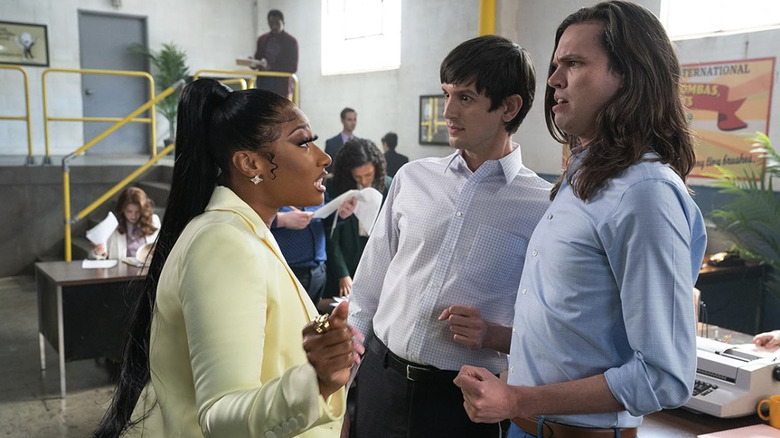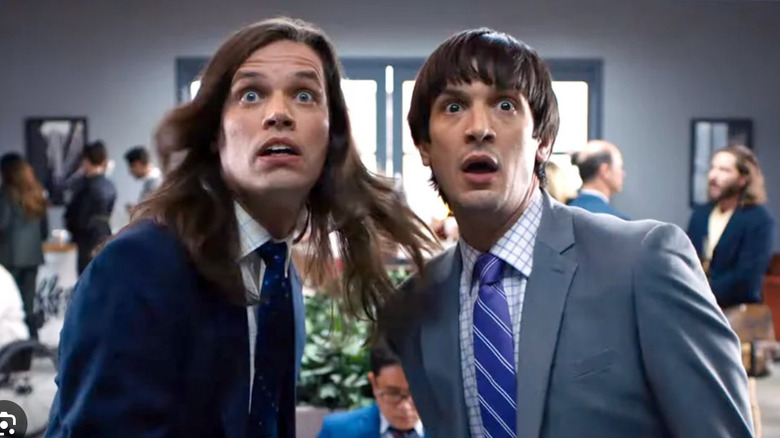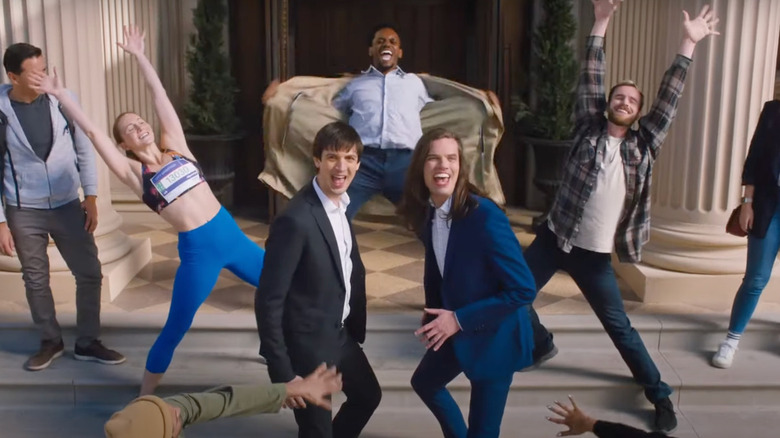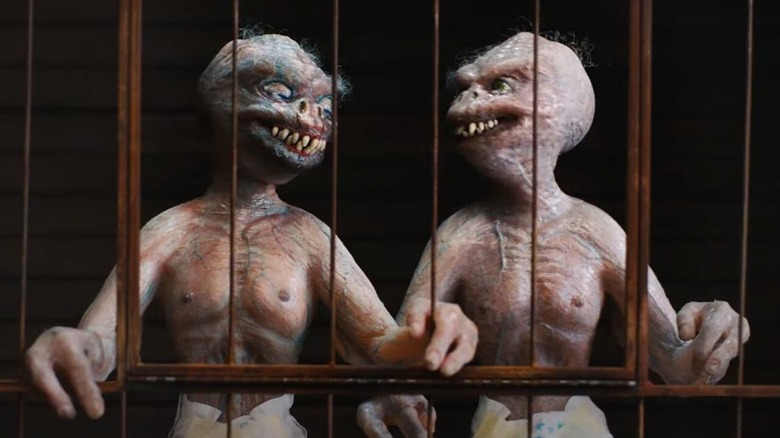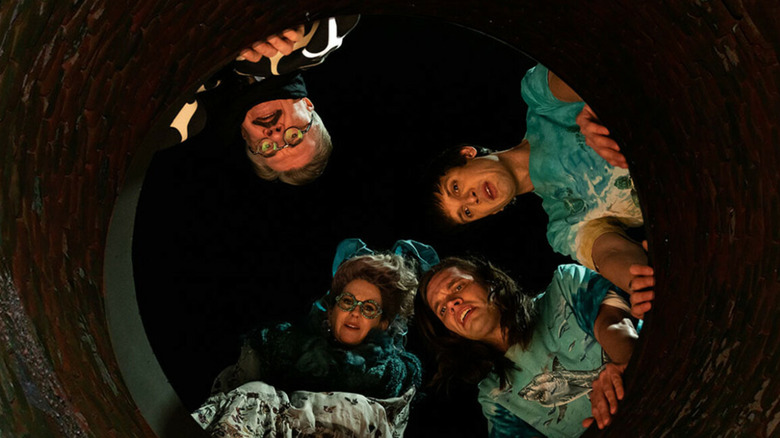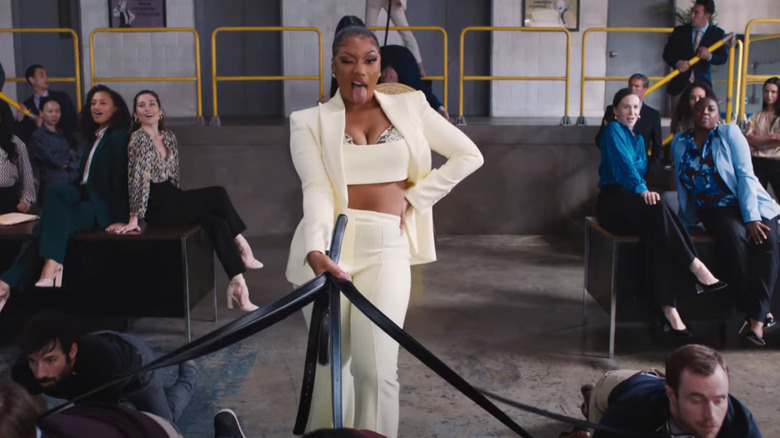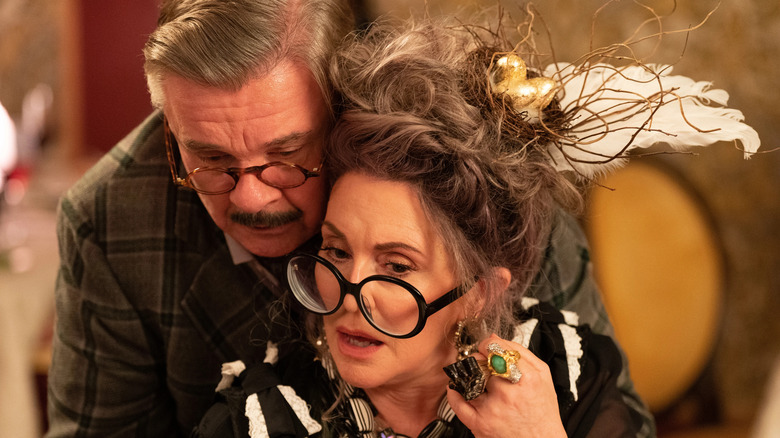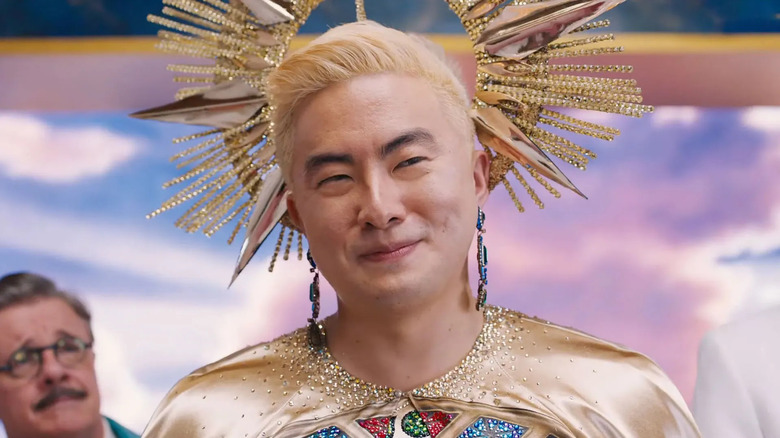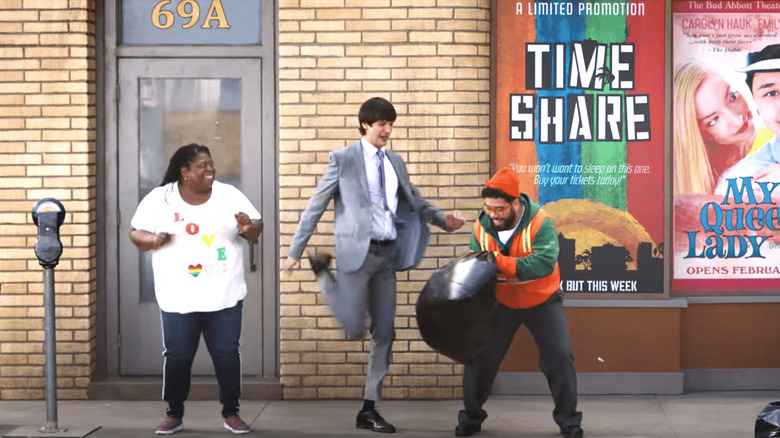Dicks: The Musical's Larry Charles On Keeping A Live Performance Vibe And Those 'Sewer Boys' [Exclusive Interview]
Larry Charles is no stranger to envelope-pushing comedy. As a writer on such subversive series as "Seinfeld" and "The Tick," as well as a director of shows like "Curb Your Enthusiasm" and the Sacha Baron Cohen films "Borat" and "Brüno," he's well-versed in the art of provocation.
Perhaps that's why he was drawn to the material which became the first musical comedy to be produced and distributed by A24, a film which features the family-friendly title of "Dicks: The Musical." The movie is a cinematic adaptation of a Upright Citizens Brigade NY show from 2014 with the even more family-friendly title of "F—ing Identical Twins," written and performed by Aaron Jackson and Josh Sharp.
Under Charles' direction, "Dicks" translates the scrappy, raucous, underground theatre vibes of "F—ing Identical Twins" while adding a little bit of star power to Jackson and Sharp's lead performances; the likes of D'Arcy Carden, Nick Offerman, Tom Kenny, Bowen Yang, Nathan Lane, Megan Mullally, and Megan Thee Stallion gleefully belt their lungs out while dealing with such things as sentient flying vaginas and monstrous little creatures known as the Sewer Boys.
I had the pleasure of speaking with Charles leading up to the film's release, and he touched upon how he came to the project, how he wrangled that cast, his philosophy on comedy in general, and more.
Note: This interview has been lightly edited for clarity and brevity.
'I was so excited by the end of it'
How's it going?
Everything's going very well, actually. Shocking and surprising, but well.
Shocking and surprising. Appropriate word choices for "Dicks: The Musical." I would love to hear about the genesis of the project from your end. When did you first hear of "F—ing Identical Twins?" Did you just happen to see it on stage?
My agent, Carolyn Sivitz at UTA, who's great, sent me — she said, "I don't know if you'll respond to this, but it seemed like they wanted to see what you thought." They were interested in me, and they sent the original tape of the revue that they did at UCB, which is how it began, and then they sent me also the first draft that was scripted [that] they tried, to sort of expand the story. Both of those things were so hilariously funny to me. I mean, to the point that I was going to my wife and going, "I'm laughing through the entire..." I never read an entire script anymore, because usually 10 pages in, I'm like, "This is bulls***," and I stop. This script, I read all the way through. I was so excited by the end of it, that I called my agent and I said, "Whatever it takes, I'd like to do this movie." And fortunately, it was a low budget movie and they weren't paying any money, so I was perfect.
What was meeting Josh Sharp and Aaron Jackson like? Did you guys hit it off right away, or was it sort of a process of learning each other's rhythms, that sort of thing?
I would say that we hit it off right away, actually. They're great. They are really great guys. They're very easygoing, they're very sweet, they're very amenable, they're very collaborative, and we immediately were on the same wavelength and laughing and having a good time. I think it was a Zoom call the first time, but we definitely had rapport. Each of these moments sort of propelled me further and deeper into the movie, because I thought, "These guys are great. I'll love to work with them. I'll get them to be great, and we could be great together."
Stage to screen
So correct me if I'm wrong, but I feel that, knowing your CV a little bit, you would consider this to be your first musical. What was that process for you like in terms of adapting stage to screen? The film feels very handmade, almost like a play. Visually rich, still like a film, and you really keep that underground theatre vibe intact. I felt like I was back in the basement of UCB or something. So talk a little bit about that.
That's great. I appreciate that, because that was what I was going for. I wanted to get ... their original show is just the two of them putting on wigs and playing all the different parts, and I love that kind of frenetic quality, and I thought this was going to naturally kind of transcend and transition to a movie kind of a thing. It's got all those elements. What was your question again?
Just how you translated stage to screen.
Right. So I wanted to keep the vibe of the live performance. And then I watched a lot of musicals, and of course there's "Rocky Horror" and there's "Hairspray," but I also watched "Singin' in the Rain" and "On the Town." I wanted to see what they did, because a musical is kind of us saying to the audience, "This is not real. This isn't a documentary. People are singing, people are making jokes, there's puppets." And I thought those kind of elements would take the play and translate it very, very appropriately to a movie format.
I also wanted to shoot a proscenium style as much as possible, the songs, so that everything was right there for you. We're singing to you and we're connecting with you, and we're looking at you sometimes. We want you to be involved in the movie and engaged in the movie. So those things were inspiration from the live show.
'Oh my God, the Sewer Boys, I love this'
I have to say, as a huge horror nut myself, I fell instantly in love with the Sewer Boys and the Flying Vagina. Could you talk a little bit about the design of them in terms of using puppetry here, keeping them "sh***y" but not too much, that sort of thing?
Right, right. It was tricky. I also, the first time I read about the Sewer Boys in the script, where they were referenced in the play, I was like, "Oh my God, the Sewer Boys, I love this. I don't know what the hell they are, but I want to be involved."
They're a part of gay culture.
Yeah, they're gay culture. That's what I discovered. And the same thing with the vagina. So I was very clear in my mind, and to everybody else, that the vagina had to be manifested in reality. So that was fun to work on that. In both cases — like the vagina, I sketched an early version of the vagina, with the ovaries as eyes and stuff like that, and we found an artist in New Mexico who did a rendering of that, and then a VFX company animated it. So that's how that came about.
The Sewer Boys, we had puppet makers, and again, I drew ... you could tell from the context of the Sewer Boys, that they're sort of drawn from "Gremlins" and things like that, so I drew a version, a kind of reptilian sewer boy that the puppeteers used as their paradigm, as their template for the Sewer Boys.
So that part of it excited me. I love the idea that this is a comedy, but it's got horror, it's got science fiction. That, to me, was ... I want everything. I was greedy. I'm comically greedy, and I wanted it all. The only way I could do it is by agreeing to shoot it in 20 days and get it all done, I could have all these elements. So it was a good bargain. It was a bargain worth making.
'We did a lot of the movie in two takes because I got it'
20 days. That's a pretty brisk shoot. Was that super challenging, or was it the right pace for you?
At first, I thought it was going to be super challenging, but it wound up being the right pace. We did one song a day. So a lot of time was spent on the day on the song, but the next day there was another song, so we had to achieve every day. And fortunately, Josh, Aaron, Nathan, Megan, Megan Thee Stallion, they were all off book, they hit it every time, they hit their marks. We did a lot of the movie in two takes because I got it. I don't need to drag it out. So the 20 days wound up giving us an energy that pushed through, and that I think the audience feels also.
I'm just guessing, based on the blooper reel that was happening during the end credits, that you didn't use playback on this. Was it all live?
We shot it all live. But we did have — I mean, there's a lot of live singing in the movie, and I wanted it to be all live singing, because I wanted that kind of punk quality. It's like it's not slick. I want it to feel a little ragged like we just did this ourselves, which we did. But as we went through it, and as Marius [De Vries], the musical director, became more involved in it, he asked if it would be okay if we use playback sometimes. So there are places ... there's kind of a balance between the playback and the live singing. Hopefully it's pretty seamless.
It seemed it to me. Obviously, this is a movie where it seeks to push a few boundaries of taste every so often. Was there anything in it originally that, whether it was the producers or even yourself or anyone involved with the film, said, "Okay, well, that's too far. We can't do that?" Or were there no boundaries?
I think all the choices, and this is again one of the reasons — this is kind of like a blessed project, in a way. All the choices that we made were creative choices. We did cut some things from the play. We did add a lot, including six new songs, but the producers were on board. They really trusted me and Josh and Aaron to come up with solutions to the problems of the script. So we came up with very innovative solutions, fortunately, and they were very supportive of that.
'Megan Thee Stallion was a mystery'
In terms of the great ensemble cast you have, convincing people like Nathan Lane, Megan Mullally, and Megan Thee Stallion to join up — was it a hard sell to get them on board, or was it as easy as how you got on board?
Megan Thee Stallion was a mystery because we wanted her to do it, but it was taken care of by other people. And I was told on the day that we were going to shoot it, she's supposedly going to show up, and she showed up and we did it, but we weren't really sure until the last minute.
But Nathan, I wrote Nathan, I spoke to Nathan quite a bit in detail, and Megan, and they were both game. I didn't have to convince them, it was more like, "What would you like to do?" and they were excited with the chance of exploring these characters, and they loved the music also and loved the comedy.
And Megan, I didn't even realize, I know Megan Mullally pretty well, and I even worked with her on "Seinfeld" once, but I didn't realize until Josh and Aaron told me that she's a gay icon. She's got this incredible voice. She's a Broadway diva also, and I didn't know that, really, about her. I knew she could sing. I knew she was on Broadway, but I didn't pay attention. So when I met her and I realized, "Oh my God, this woman has unbelievably immense talents that she doesn't get much of a chance to really express," I knew we were on the right track also, because it's a revelatory performance. So I felt very lucky about having her on board.
And Nathan is a national treasure, and he never does a false move. Every instinct he has is right, and I really respected and admired that and I wanted to make sure that his performance was epic as well, and they matched each other pretty well, and I think it worked out.
'The editor of the movie, for me, is a very important person on numerous levels'
I know I kind of asked about things you weren't allowed to do. Is there anything that was in there originally and you had to delete it for whatever reason that might show up on a future release, either physical or digital?
Well, because it was 20 days and it was a very tight script, although we did a lot of improvising, there's no scene that's cut. Every scene that we shot is actually in the movie. And then within that framework, the editor and I worked on shaping it, on coming up with editing solutions to things, split screens. I did some camera tricks to get laughs that we used. But again, I think it was that 20 day thing that really defined the whole experience.
Since you just brought it up, I was actually going to ask about the editing process on this. Could you talk about working with Al LeVine in terms of cutting a musical?
The editor of the movie, for me, is a very important person on numerous levels. They have to have the aesthetic and the sensibility, of course, but I also have to be able to spend 12 hours a day for months in a room with them. Al covered all the bases. He's a really cool guy, great sense of humor, very game to experiment. So together in the room, we go, "Let's try this. Let's try that. Let's see what happens if we do that." So we were able to take that raw footage and kind of shape it into even more distinctive sequences.
'I'm looking for outrageousness on some level'
I'm fascinated by the fact that you have this varied career in comedy. And this project in particular, it pushes some buttons here and there, and obviously seeks to try and be a little bit risqué, to say the least. As a comedian yourself, do you feel it's important to push the envelope in comedy? Is that something that really drives you as a creator? Or is it more just whatever you're responding to at the moment?
Well, I'm looking for challenges. So I don't want to repeat myself, necessarily. I would prefer not to do that. I'm looking for outrageousness on some level. Transgressiveness, I would say.
I'm looking for something that's transgressive, that sort of goes against the common wisdom. But when I take on a project, I believe that movie could be a hit. I believe that movie could reach a wide audience, and I felt that way about this movie from the very beginning. I feel like it's got great songs, it's really super funny. [It's for] people who are looking for a laugh out loud comedy, which is very rare, almost impossible to do these days. And because this movie is two gay men playing two toxic straight men, it gave us permission to be anti-woke woke. So that's how I describe this movie. It's like an anti-woke woke movie, or a woke anti-woke movie. That gave us the permission to do all that. That's very interesting to me, but in the end, the thing you said that probably resonates most is it's just by instinct. If I read something and I just respond to it, then I trust that there's something worth responding to there, at this point.
'I tried to make this movie like I try to make all my movies, like a great album'
One of the other things I really love about the film is there's a lot of Easter egg jokes in there. Everything from the name of the company the characters work at down to the fake TV shows or Broadway shows that are on posters. Do you have a favorite Easter egg joke in the film?
Oh man. I don't know that I do, actually. I love planting all the Easter eggs. So to me, I'm very pleased ... I mean, I'm still seeing things in the movie that people haven't noticed yet. And I'll be curious when people start noticing some of those little Easter eggs that go by so quickly that people haven't seen it.
I tried to make this movie like I try to make all my movies, like a great album. You're not going to listen to it once. You can listen to it over and over and over again, and it's going to have different meanings each time you listen. That's the kind of movie this is. It's going to unleash its riches over time as well. Not just in an initial viewing, but over time as well.
"Dicks: The Musical" is in theaters beginning this Friday, October 6, 2023.
